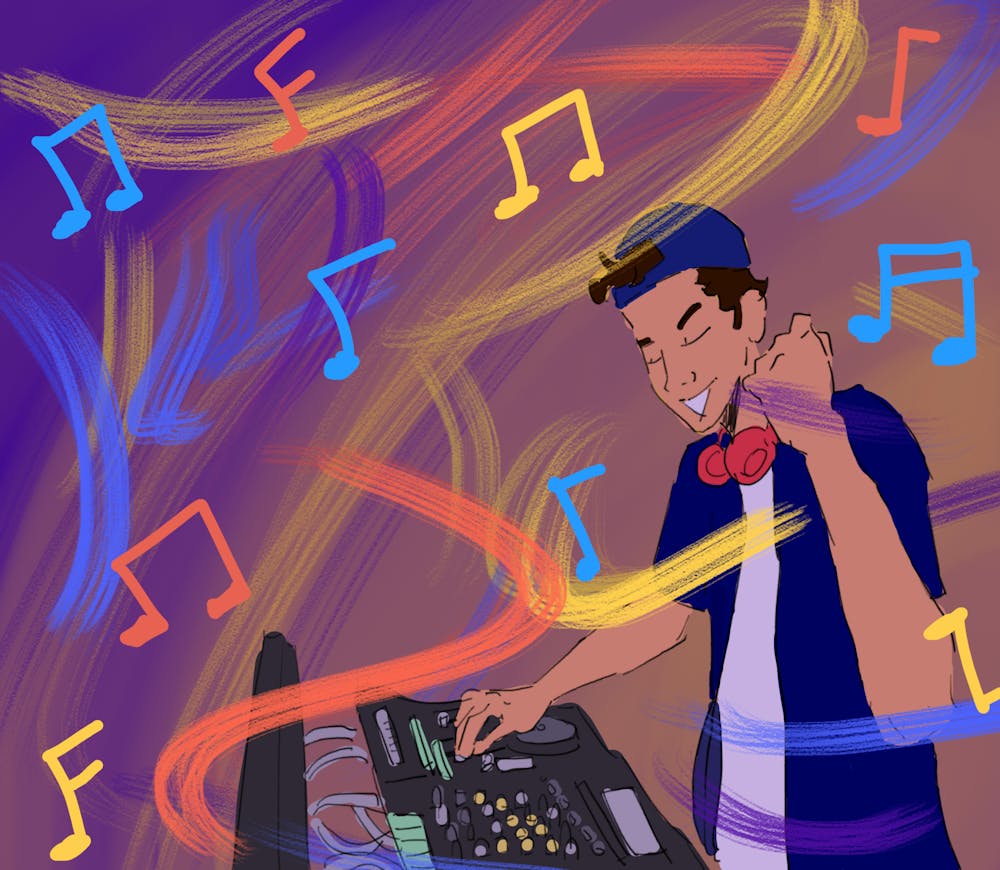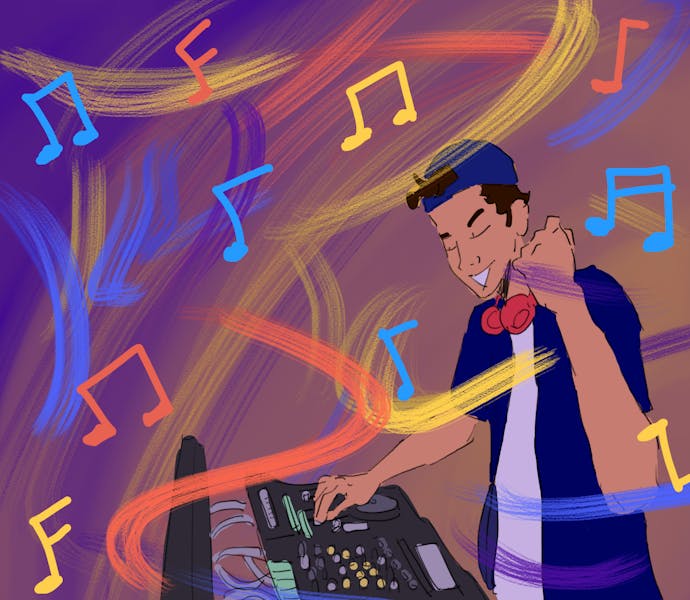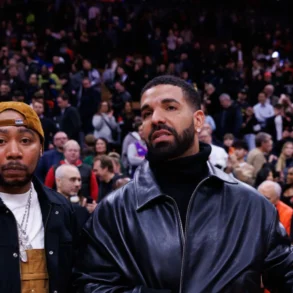
In a Baker College single, a D’Angelo vinyl spins and two sunset lamps frame a soundboard and speaker: Devin Gonzalez has a room made for a DJ.
Gonzalez, a senior who performs as “DJ Dev,” is known for his work both on and off campus. Outside of DJing Architectronica, he has held residencies in Austin and London-based stations, as well as guest spots in San Francisco, San Diego and Los Angeles throughout the years.
“Fundamentally, DJing is about creating the experience for the people on the dance floor or wherever they are,” Gonzalez said. “Before, there’s a certain amount of anxiousness, and you anticipate how the crowd’s going to react or whether you chose the right songs or the flow of the event. But as soon as I hop on stage, it feels like I completely change, or I switch off. I just lock in and … get a boost of confidence.”
Gonzalez is far from the only DJ on campus. In recent months, student DJs seem to have increased exponentially, with more popping up with each passing day. This is not a Rice-specific phenomenon, though. Off the heels of “Brat” summer, DJing as a form of not only art but performance has creeped into the cultural mainstream.
“There’s a lot more content on social media about DJing, especially boiler room, or other online media outlets that just clip or add the cameraman into the DJ booth,” Gonzalez said. “Historically, DJing isn’t that showy. It used to be tucked behind in a different room or booth, but now it’s becoming more popular online, so it’s seeped down into a college environment.”
Maaz Zuberi, a Jones College senior who performs as simply “Maaz,” echoed a similar sentiment.
“I think it’s kind of like a pop culture trend that’s happening right now],” Zuberi said. “It’s becoming accessible, too. DJ gear is not too expensive … there’s not that many roadblocks now.”
Zuberi also pointed to how a passion for music factors into DJing’s rising popularity.
“I think it’s just another level to enjoying music,” Zuberi said. “People that enjoy music are really starting to learn ‘You know, what? If I had a little more control or granularity over what I listen to, I can make it sound a little bit better.’”
Tania García-Jasso, a Sid Richardson College senior who performs as “DJ Tanz,” welcomes the recent influx.
“I think that it’s a hobby that people are more intrigued by, especially as more people pick up on it,” Garcia-Jasso said. “It inspires other people to maybe try it out. I do think that the amount of DJs is a little funny, but I also think that it’s great, because it just means that we’re gonna have more variability in music and exposure to it,”
Zuberi also noted some cultural pushback to the recent influx of new DJs.
“I think everyone hates when their niche goes mainstream,” Zuberi said. “I think it’s cool … I never see it as competition against me. Like, who cares? At the end of the day, the best DJ should get the gig, and if there’s more DJs, so be it … that means you have to be a better DJ.”
One newcomer to the Rice DJ scene is Jorge Albores, a Lovett College freshman.
“My advisor found out that I [DJ] so they were like oh like, would you like to DJ Dis-O and…that was like the first thing here,” Albores said.
After some deliberation, Albores decided to begin performing as “DJ Lov,” a name inspired by his residential college and the place where his Rice DJ career began.
Albores only has only a few months of experience, having received his first board as a high school graduation gift. However, he hit the ground running, getting attention on campus within days of arriving. Albores attributes much of his current success to the social media platform, Fizz. According to Albores, posts about his sets have led people to connect him to his DJ name.
“My friend in my math class has sat next to me since the first day, and then this last week, he’s like ‘Oh, you’re DJ Lov!’” Albores said.
DJing in the age of Fizz complicates the experience, according to Zuberi. On the anonymous platform, anyone can say anything about anyone, including — and especially — about DJs.
“The Fizz era is tough out here,” Zuberi said. “This year I DJed the first pub [night] … and I made the mistake of checking Fizz … [the app] is kind of the breeding ground of hate. [But] it doesn’t really affect me because everyone I’ve actually talked to was like, ‘Oh, you did a good job.’”
Despite the often-overwhelming noise that comes with being a DJ at Rice, according to García-Jasso, DJing can be an uniquely fulfilling experience for all parties involved. She described DJing as a melding between herself and the crowd.
“It feels less like I’m putting on a performance and more like I’m trying to become one with the crowd,” García-Jasso said. “You have to match the vibes as closely as possible to what the crowd is reacting to, and this takes into account mistakes, unforeseen events, the crowd reacting unexpectedly to songs. You just have to go with the flow, but it’s an incredible amount of flow.”
As the DJ scene on campus grows, García-Jasso hopes that it comes with an increase in diversity.
“I would say that the DJ scene is mostly non-women…If there’s one thing I wish I could see at Rice, it’s more women DJs … I think that we have a lot of potential. Everyone has so much potential. I really think so. Women, non-women, etc. I just think that hopefully, as more people get interested, there will also be an increase in people coming up with cool ideas and cool collaborations and fun themes, things like that.”
This post was originally published on this site be sure to check out more of their content.







